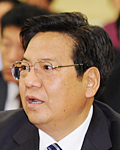|
For decades Zhejiang has been the vanguard and heart of China's private economy. In the next five years, the province will continue to ensure a sound business environment for private small and medium-sized enterprises and put them on equal footing to compete with state-owned counterparts. This will also effectively shore up the employment landscape and help with the people's livelihood.
 |
|
Li Yining (ZHANG DUO) | Raising Farmers' Income
Li Yining, Member of the 11th National Committee of the CPPCC and professor at Peking University's Guanghua School of Management:
The 12th Five-Year Plan clearly states that we should "increase income sources for people living in rural areas."
In 2010, I went to Shandong Province with a team to research the rural housing system reform.
We found many farmers went to cities to earn money and left their village houses empty and unattended. According to the National Bureau of Statistics, an annual increase of more than 1 billion migrant farmers flock to cities; the rural housing vacancy rate is currently about 30 percent.
Farmers can rent their vacant houses out and make some money. But it is very difficult for them to get loans from banks since they can't use their houses as mortgage. To expand domestic demand, we must increase the purchasing power of farmers. Something should be done to change the current situation, to ensure farmers have more sources to raise their income.
 |
|
Feng Jicai (SONG LIDONG) | Protecting Cultural Heritage
Feng Jicai, Member of the 11th National Committee of the CPPCC and Vice Chairman of the China Federation of Literature and Art Circles:
In 2006, the second Saturday in June was set as Cultural Heritage Day. Since then, we have attached greater importance to cultural heritage preservation and have built up a cultural protection system. But there are still some crucial problems nowadays in cultural heritage preservation. Some local governments put more efforts in applying items for cultural heritage but fewer efforts in protecting them. Local government officials even connect heritage applications with the evaluation of their political career achievements.
Now many items of intangible cultural heritage have been included on the national protection list. However, most of the listed heritage items are being commercialized and the areas around them industrialized. It's sad; many of our folk arts—paper cutouts and shadow puppets—are handmade, but after they are commercialized they lose some of their original flavor and are used only for making money, not preserving our culture.
This is destroying traditional culture. The purpose of protecting cultural heritage is to maintain the diversity of human culture. Cultural heritage become more an image project for the government.
Ancient villages are quickly disappearing. I conducted research for Tsinghua University about the number of existing ancient villages in China and the result is astonishing. In Shandong Province, for example, we can hardly find an intact ancient village at all. The local governments pulled down the villages to build modern structures and many people aren't even aware of, or have shown little interest in, the need to protect ancient villages. These villages are the root of our country's culture and if we don't pay attention now, in 10 years we won't be able to find a single one of them anywhere in China.
 |
|
Ge Jianxiong (WEI YAO) | Reforming College Recruitment
Ge Jianxiong, Member of the 11th National Committee of the CPPCC and professor at Fudan University in Shanghai:
College education reform has been a hot topic for a long time. Since 2003, a number of universities in China have gradually expanded independent recruitment of students. With this system, the universities can choose students by using independent exams, not the national college entrance exam. This system has, to say the least, caused disputes. Many people are concerned fraudulent activities will ensue and since only a very small number of students can be nominated to take part in independent recruitment exams, it is unfair for other students who don't get the chance.
I admit that there are problems with this system, but they're not as serious as people may think. Taking Fudan University as an example, in the interview exam we have five professors interviewing one student, and we decide by lots which five professors conduct the interview exam. That means even if the students want to cheat, they would have to know each and every professor, which is almost impossible. The interview process is also recorded on video, which leaves little room to cheat.
The independent recruitment system is new in China and, as such, needs some time to improve.
 |
|
Dorje Tseden (MA ZHANCHENG) | Serving the Ageing Population
Dorje Tseden, Member of the 11th National Committee of the CPPCC and Director of the Qinghai Provincial Committee of the Communist Party of China:
China's ageing population is growing rapidly. According to the latest figures, China currently has 20 million people over the age of 80. That number will quadruple in 40 years. By 2050, 400 million Chinese will be above 60 years old that means one in every four Chinese will belong to that category.
China is likely to grow old before it grows rich. The conflict between a growing ageing population and incomplete insurance system for that a population is going to be more severe in the following years. Qinghai Province, located in remote northwest China and with a large rural area, faces a much more serious situation in dealing with the aging populations. At the end of 2010, there were 563,200 people aged 60 and above, occupying 10 percent of the province's population. Three quarters of the ageing population in rural areas live in poverty, but we only have 119 senior citizen homes all over the province and most of them are not well-equipped to deal with the population as it is.
In other provinces, senior citizen homes are also few and far between. That's why for most Chinese, when they grow old, they stay with their children or spouses.
More of the state budget should be put toward serving China's ageing population, including building more infrastructure and improving services in senior citizen homes. The government should also encourage insurance companies to be more involved in providing services for the elderly.
 |
|
Zhang Yuanfu (WANG YE) | Creating Work in Rural Areas
Zhang Yuanfu, Member of the 11th National Committee of the CPPCC and Chairman of Changchun Municipal Committee of the CPPCC:
Today, we have millions of college students who can't find a job after graduation. It's estimated that in 2011 the number of unemployed college graduates 6.6 million, and in 2012, the number will increase to 7 million.
On the other hand, there is always a shortage of college graduates in the rural areas, especially remote rural areas. But the word "rural" or "agriculture" is always connected with low-income and harsh conditions. Besides, parents and teachers in rural areas always ask students to study hard so that they can get out of the countryside—this is the main goal of rural students. So it's perfectly understandable these students don't want to go back to where they came from.
Another reason is that the social security system and public service system in rural areas are far from complete compared to big cities.
I think we can set a short period of time where students get the chance to experience life in rural areas first and then they can decide whether they want to stay longer or not; they don't have to make the decision before they go there. I think if we want to modernize our agricultural sector, we need to attract more college students with professional agriculture backgrounds and get them to stay. | 